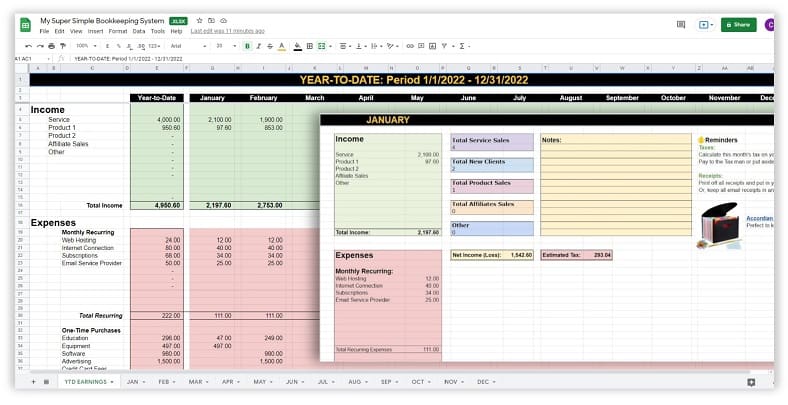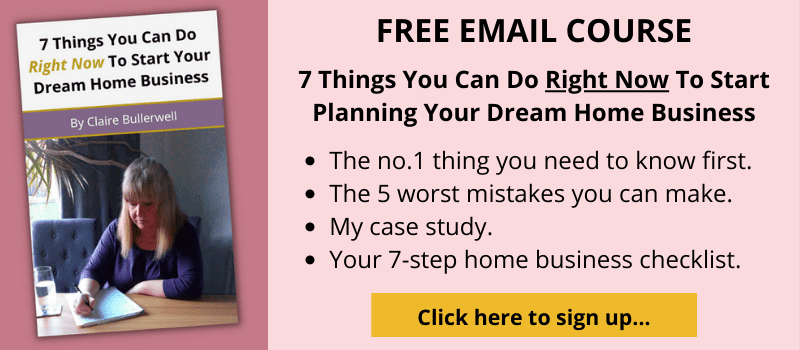I’ve been self-employed, on and off, since I was around 24 and I became self-employed again at the age of 51.
There are a variety of reasons why women want to become self-employed, but how do you actually become self-employed? What exactly do you need to do?

Here I’ll try my best to guide and help you to become self-employed based on my own experiences, experience which I’ve garnered over the past 25+ years.
But before you take this massive leap, you need to know for sure if you’re really cut out for self employment, as not all people are.
1. Is Self-Employment For You?
Being self-employed has a lot of responsibility attached to it, so you need to know if you can handle the responsibility of setting up and growing your own business.
You need to ask yourself questions such as:
- Am I willing to start climbing this steep learning curve?
- How will I manage the unpredictable income?
- How will I manage vacations?
- What about bookkeeping?
These questions, plus a lot more, are really important to know the answers to before you delve into self employment.
Related Reading: Is Self-Employment Right for You?
In addition to the added responsibility, there are other tasks which you have to do which you mightn’t be aware of. These are discussed below in this post.
2. Choose Your Dream Home Business
Once you’ve decided that you definitely do want to become self-employed, then it’s time to find your dream home business.
This is a three-step process – in my opinion:
Step 1: Find out about all the different types of home businesses there are to choose from.
Step 2: Do a detailed self-assessment.
Step 3: Revisit all the home business ideas, but this time armed with your self assessment. Then use your self-assessment to match against the best home business which is suited to you the most.
I cannot stress how important it is to do this self-assessment; because how will you know what is the best home business for you if you don’t know you very well!
Alternatively, you might already have a business idea but don’t know what to do next.
If this is the case, I would still urge you to do a self-assessment to see if this idea really is the best one suited to you.
If you are absolutely certain that this idea is your dream home business, then carry on reading the rest of this post.
3. Understand What Self-Employment Entails
Once you’ve decided on your business idea, you then need to know your actual business tasks along with general self-employed tasks.
So sit down with a notebook and pen – or spreadsheet – and brainstorm exactly what tasks you’ll be doing on a daily, and weekly basis.
Your Business Activities
- What will you be doing on a day to day basis?
- Does this include travel, if so; is this by car, bus, train?
- Or will you be sitting in front of a computer all day?
- What tasks will you do on the computer – will you need Zoom?
Basic Bookkeeping
This can be a real headache for some small business owners (me included) because you either just don’t have a head for numbers and/or you find this task so boring and mundane.
But, it is essential that you keep on top of your business finances.
- You need to decide if you’re going to do the bookkeeping yourself, or are you going to hire this out to someone else?
- If you’re going to do this yourself, you’re going to have to set up a system so it gets done and done correct.
Simple Income & Expenses Spreadsheet
I have very limited knowledge of spreadsheets, however I managed to create a simple income & expenses spreadsheet for my own personal use.
And it works like a dream.
So I thought I would offer it to anyone who wants a simple spreadsheet to track their income & expenses. It also provides a year-to-date profit and loss statement too!
Learn more about the spreadsheet here
It’s fully populated with all the formulas so it makes in automatic. You simply put your numbers in and it will do the rest for you.
Purchase This Income & Expenses Spreadsheet Here
Quickbooks
Most service-based businesses find using an online software such as Quickbooks the quickest and easiest way to keep on top of their invoices and cash-flow in general. This way you can do your own bookkeeping and not have the added expense of hiring or employing a bookkeeper.
However, don’t forget that software such as Quickbooks does come with a monthly fee, and you still have to do your self-assessment tax return each year.
I’ve never used Quickbook (or a similar software) but I’ve heard it has a pretty steep learning curve, so take that into consideration too.
Marketing & Advertising
- How are you going to let people know about your business?
- What marketing activities are you going to do? Are you going to do online marketing, offline marketing or both?
- Do you need a website or will a Facebook Business Page suffice?
Related Reading: Grow Your Business With a Digital Marketing Strategy
Again, you could hire this out to someone else (especially for online marketing) or will you include this in your own business activities?
Email & Telephone Enquiries
Once your marketing and advertising kicks in, how are you going to handle the enquiries?
- Are you going to put your telephone number on your marketing materials or an email address or a website address?
- Will you answer your cell phone yourself, or will you let the enquiries go to your answering machine where you’ll catch up with them early evening?
- You’ve paid for these enquiries through your marketing and advertising materials, so you need to make sure that you have a system to handle them efficiently and not let them slip though the net.
General Admin Work
Don’t forget the mundane admin work!
It comes with all small businesses, albeit some more than others, depending on what type of business you run.
General admin tasks can include:
- Email and telephone enquiries
- Customer service / handling complaints
- Giving out free quotes (in person)
- Your customer database
- Bookkeeping
- Invoicing
- Chasing up invoices
- Handling refunds
- Marketing & advertising
You’re likely to come across other admin tasks which you haven’t even thought of yet.
4. Get Out of Your Comfort Zone
This is a big one and not many people actually factor this into the self-employment equation.
Yes you may hate your current job, but you might also be within your comfort zone in your everyday job and your everyday daily routine.
So when you do anything that’s new, this will inevitably push you out of your current comfort zone. Therefore you’ll have to prepare yourself for some inner turmoil because becoming self-employed is a massive step for anyone.
When I say inner turmoil, this will be a mixture of
- Excitement
- Fear of the unknown
- Fear of failure
- Stress
- Worry
It’s only when you carry out your new self-employed daily activities over a period of time, that they will then become your new norm – your new comfort zone.
So even though you’re going to go through an initial ‘turmoil’ stage, you can have peace of mind knowing that this is just a stage which will eventually pass.
5. Get Into The Right Mindset
Mindset is massive when it comes to starting your own business.
In fact, I would go as far to say that mindset will be the difference between your business being a success or a failure.
“Whether you think you can, or think you can’t… you’re right.”
So it’s imperative that you keep a strong and positive attitude as much as you possibly can.
Of course you’re going to have doubts from time to time, you’re only human and doubts creep into most peoples’ minds when starting a new business, but try to have a positive mind most of the time which will outweigh any negative thoughts.
How to get into a positive frame of mind?
There are many different ways to do this of which I talk about in this post…
Related Reading: 7 Daily Habits of Successful Women in Business
Just pick one or two mind-work techniques which work for you.
For example, I’ve tried journaling each morning as many fellow female entrepreneurs swear by this approach as it’s so impactful for them.
But not for me.
For some reason, I just can’t stick to a routine of writing/journaling my goals and intentions each morning.
What I do instead is that I just literally ‘think’ positive.
If any negative thoughts come into my mind, I try to reason with them and justify why they shouldn’t be there. I then set about creating and carrying out tasks which will get me one step further towards my goal which, inturn, will prove my negative thoughts wrong.
I hope you understand what I mean here.
So my positive mind-work is:
Thoughts + Action
Thoughts: Always think positively about achieving my goal.
Action Steps: Get rid of negative thinking by taking action steps towards my goal to prove that these negative thoughts are wrong and don’t have a place in my mindset.
6. Research & Planning
You need to know for sure if your business idea is viable and that your new home business has a strong chance of succeeding.
Even though you may see other businesses in the same niche as you succeeding, you still need to do your own market research. You should never start your own business purely based on the success of similar businesses to yours.
There are many reasons and variables as to why you should do your own initial market research:
- You might be targeting a slightly different audience to that of your competitors.
- You will have your own unique slant on the same business model.
- Your marketing message will be unique to you and your business.
- Your marketing message will speak directly to your potential customers.
- You will have strengths which your competitors don’t have.
- You’re unique – there’s only one of you!
So as you can pick out from this little list, you need to do market research to identify your ideal customers, to come up with an amazing and unique marketing message and to identify your strengths and weaknesses.
7. Create an Informal Business Plan
After you’ve done your market research, you need to put all this important information which you’ve gathered into some form of logical order, and the best format to put it into is an informal business plan.
And don’t panic by the thought of doing a business plan, it’s not half as formal or as scary as it initially sounds.
The way I view my informal business plan is that it’s my business roadmap. It’s my success path to follow to help me reach my business goals, and I suggest you create a business plan and use it as your road-map too.
8. Licences/Permits/Insurance
It depends on what type of home business you run, but you must find out if you need any special licences to run a small business from home.
This is especially true if you have people coming into your home and if you go out into other residential homes. If this is the case, I know that you’ll need special insurance (probably liability insurance), but check to see if you need a license or a permit.
So check to see if you need a special type of insurance and also make sure you check with your local authority to see if you need a license or a permit.
9. Just Get Started
I know that this may sound like stupid advice, but you’ll be surprised how many people plan, plan and then do some more planning…. and then never get started!
Why is this?
FEAR!
Fear is the biggest source of procrastination.
This step goes hand-in-hand with step #4 Getting Out of Your Comfort Zone.
I’m guilty of procrastination myself on many occasion and I often struggle to understand exactly why I’m procrastinating. Why I have not started my xyz project yet?
And the answer is hidden fear.
It can be so frustrating knowing that you’ve done all the research and planning that needs to be done, but you keep making excuses not to do those tasks – those tasks being the ones which will get you another step nearer to your goal.
So just be aware of hidden fear, get out of your comfort zone and push forward with positive thinking and taking little action steps.
10. Become Legally Self-Employed
Now comes the exciting step of actually registering your business with the IRS/Inland Revenue to become self-employed legally.
At this stage you need to know if you want to register as a sole trader/sole proprietor or a limited company.
Also, in the US you need to register your business name.
You don’t need to do this in the UK
So make sure you look into what’s involved in registering as self employed in your country and specific area, you can start with a simple Google search and read your Gov’s website.
11. When Things Go Wrong
Unfortunately no matter how much research and how much planning you’ve done, some things just won’t go according to plan.
And you know what? That’s OK!
Some things will go wrong which are out of your control, and other things will go wrong where you’ve made an incorrect decision.
And the best way to deal and tackle these situations is to learn from them.
- If someone has let you down – do you want to use their service again?
- If you’ve made a bad decision – how can you not make this same mistake twice?
So when you look at mistakes and mini failures like this, think of them as learning curves to iron out any teething problems and bumps, so eventually your business will be running like a well-oiled machine!
Related Reading: How To Handle Failure in Business
12. Enjoy Yourself & Have Fun!
And last but not least, enjoy yourself in your amazing new business.
Becoming self-employed when you’re in your 50’s doesn’t have to be a daunting task. Think of it as an exciting new chapter in your life, a chapter just for you.
In all the personal development books I’ve read, they’ve all relayed the same message:
“Focus on the journey, not the destination.
Joy is found not in finishing an activity but in doing it.”
— Greg Anderson
What this essentially means is that you shouldn’t wait until you’re earning $xxx amount of money before you’re happy. Be happy NOW by enjoying the experience and the journey in order to reach and achieve your goal.
What Next?
If you’ve read this far and you definitely think that becoming self-employed is for you, then why not get stuck in and get started with my Home Business Roadmap.
I wrote this ebook + bonuses to specifically help women to find and start their dream home business so they can reach new goals.
Hi, I’m Claire Bullerwell
I’ve ran dozens of home-based businesses, both offline and online, since my early twenties. I started this blog to share all my wealth of knowledge and experience to help women just like you; to find your dream home business and to live your best life.
Follow me and let’s get acquainted…



